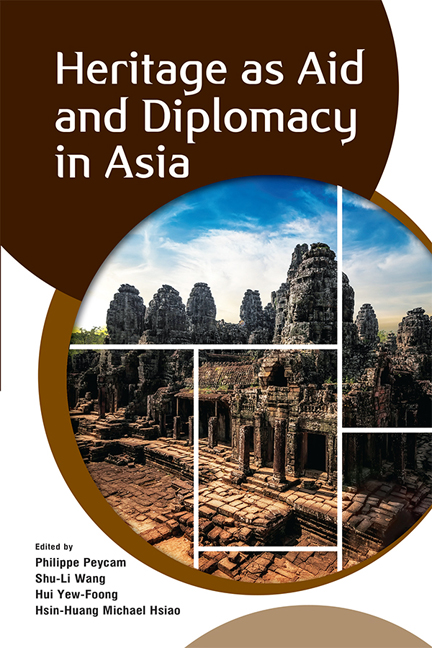Book contents
- Frontmatter
- Contents
- Contributors
- 1 Heritage as Aid and Diplomacy in Asia: An Introduction
- 2 World Heritage and WikiLeaks: Territory, Trade and Temples on the Thai-Cambodian Border
- 3 Heritage Making – Aid For Whom? The Genealogy of Expert Reports in the Hands of Politics and Their Impact in the Case of Preah Vihear
- 4 The International Coordinating Committee for Angkor: A World Heritage Site as an Arena of Competition, Connivance and State(s) Legitimation
- 5 Legacies of Cultural Philanthropy in Asia
- 6 To Help or Make Chaos? An Ethnography of Dutch Expertise in Postcolonial Indonesia
- 7 Heritage Conservation as a Tool for Cultural Diplomacy: Implications for the Sino-Japanese Relationship
- 8 From Ideological Alliance to Identity Clash: The Historical Origin of the Sino-Korean Goguryeo Controversies
- 9 Nationalism, Politics and the Practice of Archaeology in Afghanistan: A Case Study of Bamiyan
- 10 Disappearing Voices: The Politics and Practice of Safeguarding Kunqu Opera in the People’s Republic of China
- 11 Neoliberalizing Heritage: International Agencies and the Local Dynamics of Heritage Conservation in Bali, Indonesia
- 12 Heritage Conservation as Trickle-Down Development
- Index
1 - Heritage as Aid and Diplomacy in Asia: An Introduction
Published online by Cambridge University Press: 10 November 2020
- Frontmatter
- Contents
- Contributors
- 1 Heritage as Aid and Diplomacy in Asia: An Introduction
- 2 World Heritage and WikiLeaks: Territory, Trade and Temples on the Thai-Cambodian Border
- 3 Heritage Making – Aid For Whom? The Genealogy of Expert Reports in the Hands of Politics and Their Impact in the Case of Preah Vihear
- 4 The International Coordinating Committee for Angkor: A World Heritage Site as an Arena of Competition, Connivance and State(s) Legitimation
- 5 Legacies of Cultural Philanthropy in Asia
- 6 To Help or Make Chaos? An Ethnography of Dutch Expertise in Postcolonial Indonesia
- 7 Heritage Conservation as a Tool for Cultural Diplomacy: Implications for the Sino-Japanese Relationship
- 8 From Ideological Alliance to Identity Clash: The Historical Origin of the Sino-Korean Goguryeo Controversies
- 9 Nationalism, Politics and the Practice of Archaeology in Afghanistan: A Case Study of Bamiyan
- 10 Disappearing Voices: The Politics and Practice of Safeguarding Kunqu Opera in the People’s Republic of China
- 11 Neoliberalizing Heritage: International Agencies and the Local Dynamics of Heritage Conservation in Bali, Indonesia
- 12 Heritage Conservation as Trickle-Down Development
- Index
Summary
In spite of a growing academic interest in the politics of heritage in Asia, few studies have directly questioned the role of international and transnational cooperation in heritage conservation. First, even though the literature has widely addressed the role of the United Nations Educational, Scientific and Cultural Organization (UNESCO) as a powerful disseminator of international standards of conservation (e.g., Askew 2010; Daly and Winter 2012; Labadi 2010, 2013a; Logan 2001), it has not yet tackled the impact of UNESCO's normative discourse on other cultural policy agents. Secondly, the social sciences have largely neglected other international structures such as the International Monetary Fund (IMF), the World Bank, the European Union, USAid, the Asian Development Bank and many others that have their own engagements in the conservation of heritage in Asia. These organizations often collaborate with UNESCO or participate in bilateral or multilateral initiatives by providing funding and “expertise” in the management of sites. The IMF, for instance, played an important role in the establishment of the International Coordinating Committee of the World Heritage Site (hereafter WHS) of Angkor under the aegis of UNESCO. Many of these initiatives are carried out by states’ cultural diplomacies in often well-thought-out strategies. Pioneer countries in cultural diplomacy include France, Italy and the Netherlands, but also India and Japan. Today, most Asian states are also engaging in cultural diplomacy. In the last two decades, China, South Korea, Thailand, Vietnam and Indonesia have considerably strengthened their investments in regional “heritage cooperation”. Some of them, like India or Japan, have a long history of cultural international intervention (Ray 2012). Thirdly, private “philanthropic” programmes like the Ford Foundation, the Agha Khan Foundation, the World Monuments Fund and the Getty Trust have long had a major impact on the management of heritage in Asia. They are now joined by newly established Asia-based foundations such as Korea's Samsung Foundation. Finally, new connections have recently been drawn between market-driven “development” schemes explicitly linking “culture” and “economic opportunities” as part of the global capitaldriven developmentalist discourse, as when WHS become mass tourism destinations incorporated in national economic development schemes (Labadi and Logan 2016).
- Type
- Chapter
- Information
- Heritage as Aid and Diplomacy in Asia , pp. 1 - 16Publisher: ISEAS–Yusof Ishak InstitutePrint publication year: 2020

